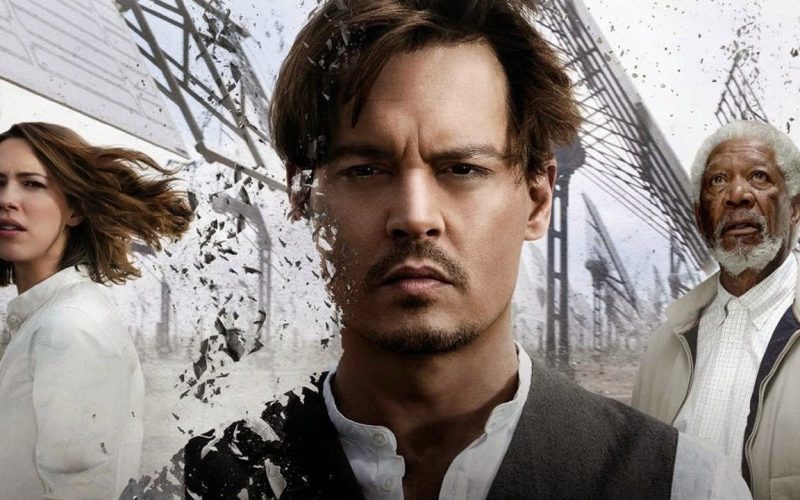Introduction
Artificial Intelligence (AI) is changing many industries, and film production is one of them. In 2024, AI is helping filmmakers make movies faster, cheaper, and more creatively. From writing scripts to editing films, AI is involved in many parts of the movie-making process. This article will look at how AI is affecting film production in 2024.
AI in Pre-Production: Helping with Scripts and Planning
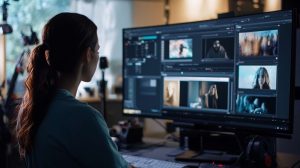
Before a film is made, a lot of planning happens. One big part of pre-production is writing the script. AI is helping writers by suggesting ideas, dialogue, and even whole scenes. AI tools like ChatGPT are helping writers come up with ideas and avoid writer’s block.
AI can also predict how well a movie idea might do with audiences. By looking at trends, it can help producers know what types of films people are likely to watch. This helps them decide which movies to make.
AI in Casting: Finding the Right Actors

Casting is an important part of making a movie. AI is making it easier for casting directors to choose the right actors. AI can look at past performances of actors and even check their social media to see how well they might fit a role. This saves casting directors a lot of time.
AI tools can also help predict if two actors will have good chemistry on screen. This way, the film’s cast is chosen more efficiently.
AI in Filming: Changing How Movies Are Shot
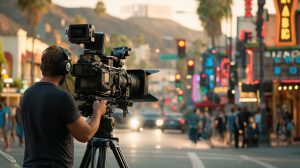
AI is also helping filmmakers during filming. One big area is visual effects (VFX). With AI, filmmakers can create special effects and computer-generated images (CGI) that look very real, without needing expensive equipment.
AI can also help choose the best camera angles and shots during filming. This means the director doesn’t have to think about it all the time, and it speeds up filming.
Some filmmakers are even using AI to create virtual environments. This means they can film scenes in places that are hard or expensive to build in real life.
AI in Post-Production: Speeding Up Editing
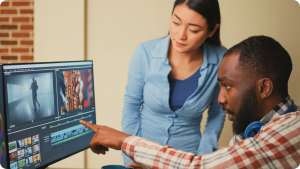
After a movie is filmed, it has to be edited. AI is making this process faster and easier. AI tools can automatically choose the best scenes, fix color, and even adjust the sound. This gives editors more time to focus on making the movie better.
In sound design, AI can help add sound effects or music that fit the scene. It can also clean up bad audio or create new sounds for a film.
AI in Marketing and Distribution: Reaching the Right Audience

Once the film is ready, AI helps it reach the right people. AI tools look at data from social media and other platforms to see what kind of movies people are interested in. This helps marketing teams create campaigns that target the right audience.
AI can also help decide where and when a film should be released. By looking at data from other films, it can predict the best places and times for the film to be shown.
AI’s Role in Film Sound Design
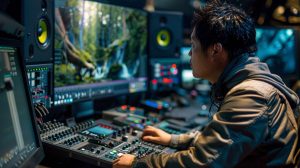
AI is also making a big impact in film sound design. It can help create background sounds, special effects, and even music. For example, AI can automatically adjust the volume of dialogue or background noise to make sure everything is clear and balanced. It can also generate new sound effects that match the mood of a scene, like footsteps or the sound of a car engine. This helps sound designers focus on the creative aspects of sound while AI handles repetitive tasks, making the sound process quicker and easier.
AI in Animation Production
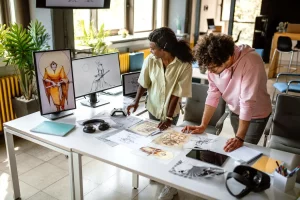
AI is changing the way animated movies are made. In animation, AI can help create smoother movements for characters and backgrounds. It can also speed up the process of drawing and coloring. With AI, animators don’t have to draw every frame by hand. Instead, AI can assist in creating the in-between frames, making the animation process faster and more efficient. This allows animators to focus on the bigger creative picture, like character design and storytelling.
AI and Virtual Actors

Another way AI is changing filmmaking is through virtual actors. AI can create digital versions of actors or even generate completely new, computer-generated characters. These virtual actors can perform in films without needing to be on set, saving both time and money. While some filmmakers use virtual actors for special effects or crowd scenes, others are experimenting with using AI to create entirely virtual movies. This opens up new possibilities for storytelling and could change how movies are made in the future.
AI in Film Distribution Decisions
AI is helping film distributors make smarter decisions about where and when to release films. By analyzing data from past releases, social media trends, and audience preferences, AI can predict which markets will respond best to a movie. This helps studios decide where to release their films for the best chances of success. For example, AI can predict which countries will have the highest demand for a particular genre, making it easier for filmmakers to plan international releases and maximize their profits.
AI in Film Preservation

AI is also playing a role in preserving classic films. Over time, old films can become damaged or degrade, making it difficult to enjoy them as they were originally seen. AI can help restore these films by fixing damaged frames, removing noise, and enhancing image quality. This is especially useful for films that may be the only copy available. With AI, filmmakers and preservationists can bring these films back to life, ensuring that future generations can enjoy them.
AI’s Impact on Independent Filmmakers
For independent filmmakers, AI is a game-changer. Many independent filmmakers work with smaller budgets and fewer resources. AI can help them compete with bigger studios by making expensive tasks, like visual effects, editing, and sound design, more affordable. AI tools are becoming more accessible, meaning that independent filmmakers can use them to enhance their films without needing large teams or expensive equipment. This gives smaller filmmakers the opportunity to make high-quality movies with the help of AI, leveling the playing field.
AI in Film Education and Training

AI is also changing how filmmakers are trained. By using AI-based tools, film students can learn how to create high-quality films without expensive equipment or large crews. For example, AI can simulate different filming techniques, lighting, and angles, allowing students to practice and experiment virtually. This makes film education more affordable and accessible, helping more people get involved in filmmaking.
AI in Script Analysis
AI is becoming helpful in analyzing movie scripts. By studying patterns in successful films, AI can suggest changes to make a script better. For instance, AI can recommend altering dialogue to make it more engaging or adjusting the structure of the plot. This helps writers improve their work and make sure it appeals to audiences. While AI cannot replace the creativity of a writer, it can offer useful insights to enhance the scriptwriting process.
AI in Costume and Set Design

AI is also used in designing costumes and sets for films. It can help create new and exciting designs by analyzing trends in fashion and architecture. AI can predict what designs will look good on screen, saving designers time when making choices. For set designs, AI can suggest layouts and even simulate how a scene will look before it’s built. This helps filmmakers visualize their ideas early on, making the production process more efficient.
AI’s Role in Improving Film Accessibility
AI is improving accessibility for people with disabilities. For example, AI can help create subtitles, translations, and voiceovers for people who are deaf or hard of hearing. AI can also help with audio descriptions, allowing visually impaired viewers to enjoy the movie. This makes films more inclusive and ensures that everyone can experience them, regardless of their abilities. As AI technology continues to improve, it will likely offer even more ways to make films accessible to all.
Challenges and Ethical Questions of AI in Film
AI is making film production easier, but there are also some problems to think about. One concern is that AI might replace some jobs. Some people worry that if AI is used too much, it could take away work from writers, editors, and other film workers.
Another issue is how AI could be used to make fake videos, like deepfakes. This is a big concern for filmmakers because AI could be used to create fake performances or manipulate actors’ images.
Finally, there’s the question of creativity. Some people worry that if filmmakers use AI too much, it might take away from the human creativity that makes movies special. It’s important to find a balance between using AI and letting human creativity shine.
The Future of AI in Film Production

Looking ahead, AI will likely play an even bigger role in film production. As the technology continues to improve, AI will become more advanced and capable of handling more tasks. In the future, we might see AI creating entire movies or working alongside filmmakers to create new and exciting experiences. However, filmmakers will need to ensure that AI is used in a way that supports creativity and doesn’t replace the human aspect of filmmaking. The future of AI in film production is exciting, and we can expect to see many changes in the years to come.
Analysis Table: How AI Affects Different Parts of Film Production
| Phase of Production | AI Contribution | Benefits | Challenges |
|---|---|---|---|
| Pre-Production | Scriptwriting, Planning, Casting | Speeds up writing, Helps find the right actors | Risk of over-reliance on AI |
| Filming | Camera Work, Visual Effects | Better visuals, Saves money | Can reduce creative decisions |
| Post-Production | Editing, Sound Design | Faster editing, Better sound | Loss of human touch |
| Marketing & Distribution | Targeting Audiences, Distribution Strategy | Better marketing, Reaches the right audience | Privacy concerns |
Comparative Table: Traditional Film Production vs. AI-Assisted Film Production
| Aspect | Traditional Film Production | AI-Assisted Film Production |
|---|---|---|
| Scriptwriting | Writers do it by hand | AI helps with ideas and writing |
| Casting | Manual process by casting directors | AI helps find the best actors |
| Filming | Filming with human decisions | AI helps with camera angles and effects |
| Post-Production | Manual editing and sound mixing | AI speeds up editing and sound design |
| Marketing & Distribution | Marketing done by humans | AI finds the best audience and release strategy |
Conclusion
In 2024, AI is having a big impact on film production. It helps with everything from writing scripts to editing films, and even in marketing and distribution. While there are some challenges and ethical concerns, AI is making filmmaking faster, cheaper, and more creative. The key is to use AI in a way that complements the human creativity that makes movies special.






